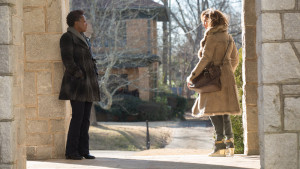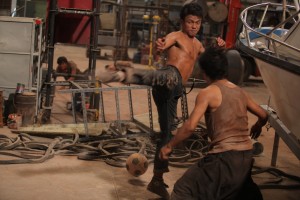
Mamma Mia, the 2008 film adaptation of the musical sensation, was an absolute delight, albeit a flawed one. Director Phyllida Lloyd, in transitioning from directing the stage play to directing the feature adaptation (with writer Catherine Johnson at her side for both), stumbles in showcasing the wonderfully choreographed musical numbers with odd cuts and cinematographer Haris Zambarloukos framing the action in a way unsuited to large performances. But even as a film that can’t always escape its shortcomings, detractors exaggerate those shortcomings to nonsensical level, with the karaoke style singing à la Woody Allen’s Everyone Says I Love You being the primary target.
The sequel with a winking title, Mamma Mia! Here We Go Again, doesn’t come from a seasoned stage director, but from Ol Parker, who brought the world the precious, queer indie romance Imagine Me & You (starring Lena Headey, Piper Perabo, and Matthew Goode, among a few familiar others). Parker, whose debut felt like Richard Curtis-lite in the best way, brings formal grace to the Mamma Mia series to complement its levity and charm (and having Love Actually filmmaker Curtis actually join him and Johnson as co-writer doesn’t hurt either).
We’re a long way from the disco-dancing, DDR-playing musical frivolity of Imagine Me & You though, as Parker sets up grand staging and choreography for many of the numbers in Here We Go Again. Tunes like “When I Kissed the Teacher” (gender-bent to become a bisexual anthem if there ever was one, with Lily James smooching Celia Imrie on stage) and “Waterloo” (a musical romp through a restaurant that feels more like old-school ABBA than anything else featured) set the stage for the characters they highlight flawlessly with extensive choreography and extras swinging their bodies left to right for our pleasure.
Where the first film focused on Donna (Meryl Streep) coming face to face with the three men she slept with in her past (Colin Firth, Stellan Skarsgård, and Pierce Brosnan) when her daughter Sophie (Amanda Seyfried) invites them to her wedding, the second explores two related narratives. Here We Go Again flows seamlessly between the past and present, following Lily James’ young Donna through 1979 as she meets her three romantic interests (Hugh Skinner, Josh Dylan, and Jeremy Irvine) and decides to live in Greece, while Sophie deals with the death of her mother, the weight of marriage, and the stress of opening a hotel and fulfilling her mother’s dreams.
As both Sophie and Donna sing “I Have a Dream” at drastically different points in their lives, the film’s theme presents itself with no shame: this is a film about finding oneself and understanding that the dreams of others may or may not be the dreams we have for ourselves. This doesn’t limit itself to the two women at the film’s core, and the most exciting feature is actually watching the young actors embody the traits of their older selves beautifully. Skinner’s Harry is as bashful and goofy as one might expect of a young man questioning his sexuality without ever really stating it, prone to awkward advances and bold declarations of dedication to the only woman he’ll ever love. Dylan’s Bill is a bundle of charm and sex appeal that makes it easy to believe the old woman in town’s rumors that he’s Europe’s greatest bachelor. And Irvine’s Sam is just as much a mix of handsome and melancholy puppy dog as Brosnan.
So much can and should also be said about the young women who play Donna’s best friends, Tanya and Rosie. Christine Baranski and Julie Walters gave Streep a supporting duo that delivered one gem of dialogue after another, blunt about their romantic entanglements in a way that was refreshing to watch onscreen. As their younger selves, Jessica Keenan Wynn and Alexa Davies get to steal the spotlight just as often as the older duo, joking about everything from cake to wanting to bang the men that Donna’s already won over (which, as viewers of the first film know, one of them does).
But the film’s shining glory is none other than Lily James. She doesn’t mimic Meryl Streep, but instead becomes a version of Donna that feels as familiar as she is utterly unique. She’s a wandering soul, but one with a sense of responsibility for herself and those tied to her. Her charisma as an actress has been present in the past–gracing a seemingly thankless role like Cinderella with her talent and giving Baby Driver’s waitress Debora all the charm in the world–but it’s on full display here. She shines in moments of pure joy, singing and dancing to the audience’s delight like she’s a young, more carefree Julie Andrews in The Sound of Music, as much as she does in scenes of introspection (from “The Name of the Game” to “My Love, My Life,” where she’s joined by both Seyfried and Streep herself in what amounts to a guest appearance in the feature).
The rest of the featured cast plays into a wide variety of musical numbers, each executed with a unique flair fitted to both the tune and the narrative being told. Where Robert D. Yeoman’s lens work with Wes Anderson seems a product of meticulous staging, Mamma Mia! Here We Go Again comes across as choreographed but loose. Individual numbers are clearly being blocked for the sake of the camera and the scene instead of simply being shot as though they were a stage show. As Seyfried and Dominic Cooper move through mirrors and rooms during “One of Us,” we witness two separate scenes flowing into each other. Other numbers like “Fernando,” in which Cher and Andy Garcia, as Donna’s mother and her long-lost Latin lover, reunite after seeing each other across a room, play out more traditionally, cutting back and forth between two individuals slowly reaching center stage after being apart.
Labeling Mamma Mia! Here We Go Again a frivolous movie isn’t entirely unfair, but dismissing it because of that would be an absolute crime. It engages with problems and disposes of them with ease like any number of optimistic, wish-fulfillment works do, and that shouldn’t be seen as a negative. Its unabashed sense of romance–be it the excitement we find in fulfilling our dreams or in flirting with a beautiful man–is proudly showcased by those who made it, and even more pleasantly, there’s a true love of the music that made it all possible running through its veins (with the film’s score itself comprised of instrumental versions of ABBA songs both featured and not, like “Under Attack”). This is a film that’s a true comfort, a new and original musical molded from a flawed first that has me saying “Thank You for the Music” every time I leave the theater.
–
Mamma Mia! Here We Go Again is playing in theaters everywhere.
Directed by Ol Parker; written by Ol Parker, Richard Curtis, and Catherine Johnson; starring Lily James, Amanda Seyfried, Hugh Skinner, Josh Dylan, Jeremy Irvine, Jessica Keenan Wynn, Alexa Davies, Christine Baranski, Julie Walters, Dominic Cooper, Colin Firth, Stellan Skarsgård, Pierce Brosnan, Cher, Andy Garcia, Celia Imrie, and Meryl Streep; 114 minutes



 Derek
Derek
 Isabelle
Isabelle